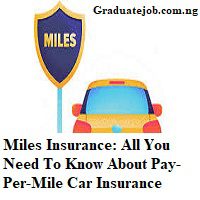Miles Insurance is revolutionizing the world of auto coverage with the new approach known as pay-per-mile car insurance. This innovative notion is gaining hold in a setting where standard insurance models frequently fall short of satisfying the needs of low-mileage consumers.
This article will explain all you need to know about pay-per-mile car insurance. Discover how Miles Insurance is transforming the driving insurance market to offer customized coverage that corresponds with your mileage patterns and budget, whether you’re a frequent road traveler or an occasional driver.
READ MORE: What Is Primary Insurance And How Does It Work?
What is miles insurance?
Pay-per-mile insurance is a novel auto insurance strategy that charges policyholders depending on the number of miles driven. This strategy differs from typical insurance, which frequently relies on set rates. The less you drive, the less you pay with pay-per-mile insurance.
A device fitted in the car measures mileage, allowing insurers to calculate premiums more accurately. This model provides a flexible and cost-effective choice for low-mileage drivers, more closely aligning insurance prices with individual driving behaviors. It’s a solution that promotes equity and affordability, especially for people who drive seldom or have shorter daily commutes.
Who is the pay-per-mile car insurance for?
1. Low-Mileage Drivers
Drivers who travel fewer miles than the average might profit greatly from pay-per-mile insurance. If you mostly use public transit, work remotely, or have short commutes, you can go for this insurance.
2. Occasional Drivers
People who use their automobiles seldom, such as weekend drivers or those who rely on alternative modes of transportation, benefit from pay-per-mile insurance. They just pay for the coverage they use.
3. City Dwellers
Because of public transportation and walkability, city dwellers usually have fewer driving demands. Pay-per-mile insurance allows them to stay insured without paying for excessive mileage.
4. Elderly People
Pay-per-mile insurance can assist retirees or older folks who no longer have extensive commutes because it matches with their decreased driving frequency.
5. Environmentally Aware Drivers
People who prioritize decreasing their carbon impact and prefer eco-friendly transportation methods may find pay-per-mile insurance intriguing, especially if they drive less.
6. Telecommuters
People who work from home or telecommute frequently travel fewer miles. Pay-per-mile insurance rewards them for driving less.
7. Students:
Students who keep their cars parked for extended periods while attending school might save money by purchasing pay-per-mile insurance.
8. Ride-Share Drivers
Pay-per-mile insurance can also cater to ride-share or delivery drivers who use their cars for work but only want to pay for personal use.
READ MORE: Carnival Cruise Insurance: What It Covers
How pay-per-mile car insurance works
Pay-per-mile auto insurance is a contemporary and adaptable insurance concept that provides a more personalized approach to auto coverage. This is how it works:
1. Mileage Tracking
When you get pay-per-mile insurance, your insurance company will provide you with a device, known as a telematics device, that you will put in your car. This device keeps track of how many miles you drive. Some insurers may also provide smartphone apps with the same functionality.
2. Data Collection
The telematics device captures data about your driving habits, such as distance traveled, speed, and, in some cases, driving behavior, such as acceleration and braking tendencies. This information is used to compute your premium.
3. Payment Calculation
Rather than a fixed monthly payment, your insurance rate depends on the number of miles you travel. You are charged a base cost for your car while it is parked and protected, as well as a per-mile rate for the miles you travel. That is, the less you drive, the less you pay.
4. Monthly Billing
Your total mileage is determined after each billing cycle, and your premium is calculated accordingly. This pay-as-you-go model provides more precision in reflecting real consumption and can result in significant expense reductions for people who drive infrequently.
5. Transparency
Pay-per-mile insurance makes your premium calculation transparent. You can access your driving data via an online interface.
READ MORE: Best International Insurance Companies In 2023
5 benefits of miles Insurance
1. Cost Savings
Cost savings are one of the major advantages of miles insurance. You pay less if you drive a low-mileage vehicle. Individuals who utilize public transportation, telecommute, or, have shorter commutes benefit the most from this because they are not subsidizing higher mileage drivers.
2. Fairness and Accuracy
Miles insurance ensures that you only pay for coverage that you utilize. This personalized method reflects your unique driving patterns, resulting in a more accurate portrayal of your risk profile. This precision can result in significant savings over time.
3. Environmental Impact
Mileage insurance is an appealing choice for ecologically minded persons looking to limit their carbon footprint. It encourages driving less, which is consistent with eco-friendly transportation options.
4. Safe Driving Incentives
Some providers of miles insurance provide safe driving incentives. Because the policy is tied to driving behavior tracking, insurers may give discounts or prizes for safe driving habits such as following speed limits and avoiding sudden braking.
5. Transparency and Control
When you buy miles insurance, you usually have access to an online site or app that displays your driving statistics and how it affects your price. This transparency enables you to track your consumption and modify your driving behavior to reduce your insurance expenses.
Final Thoughts
While miles insurance is a good fit for low-mileage and infrequent drivers, you should analyze your driving habits to know if it suits you. Additionally, compare prices from other insurers to choose the best option.
Miles Insurance offers a compelling array of benefits to individuals who drive less and want a more personalized, cost-effective, and environmentally responsible insurance solution.






